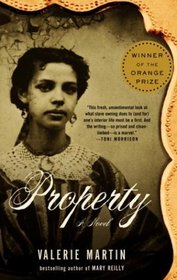Helpful Score: 3
A terse, tight and tense vignette exploring the unique relationship between master and slave....not a perspective mined by many other authors. This book will make you think long after you read it. It is a quick read, appearing factual and with plotline on the surface. But its true commentary is insidious, echoed soleley between the lines as one reads and wonders and fills in what must have been the thoughts of the characters.
Helpful Score: 1
I read this all in one sitting over the weekend and, while I enjoyed it, I think I probably missed the true point of it until the very last line of the novel. The first-person manner in which the story is told leaves the reader wondering what other people's takes on the events of the the book might be. The novel felt a little unfinished to me - a lot of loose ends left hanging - but I think that it's meant to leave you thinking rather than have everything tied in a neat bow. All in all, a good read.
Helpful Score: 1
I'm not one to normally take interest in historical fiction, but Valerie Martin presents the story in such a manner that one almost forgets that she is writing about slavery in 1828 Louisiana. The universal concepts within the story make it timeless. The book's short length and easy vocabulary make this a very quick, but interesting, read.
Manon, from whose point of view the story is told, is very cynical about her position as the wife of an unsuccessful plantation owner, about his relationship with her slave Sarah, and about life in general. She is not unlike the slaves in that she too is treated as 'property'.
Manon, from whose point of view the story is told, is very cynical about her position as the wife of an unsuccessful plantation owner, about his relationship with her slave Sarah, and about life in general. She is not unlike the slaves in that she too is treated as 'property'.
This is a very quick read, and really let's you into the mind of a slaveowner from that time period. Very thought provoking and riveting.
Very good book about the mindset of people who owned slaves in the South before the Civil War. I loved it -- hard to put down.
Very interesting book. I liked it very much.
This a short book that kept me up late finishing it, in spite of its infuriating narrator. She is the spoiled and self-centered wife of a cruel plantation holder, yet has only a little more freedom (and less gumption) than the slave who is both her maid and her husband's mistress. The fate of each of them is tied to the actions of the other at several crucial junctures and the book left me contemplating the use and abuse of power.
Valerie Martin's Property delivers an eerily mesmerizing inquiry into slavery's venomous effects on the owner and the owned. The year is 1828, the setting a Louisiana sugar plantation where Manon Gaudet-pretty, bitterly intelligent, and monstrously self-absorbed-seethes under the dominin of her boorish husband. In particular she resents his relationship with her slave Sarah, who is both his victim and his mistress.
Exploring the permutations of Manon's own obsession with Sarah against the bckdrop of an impending slave rebellion, Property unfolds with the speed and menace of heat lightning, casting a startling light from the past upon the assumptions we still make about the powerful and the powerless.
Exploring the permutations of Manon's own obsession with Sarah against the bckdrop of an impending slave rebellion, Property unfolds with the speed and menace of heat lightning, casting a startling light from the past upon the assumptions we still make about the powerful and the powerless.




